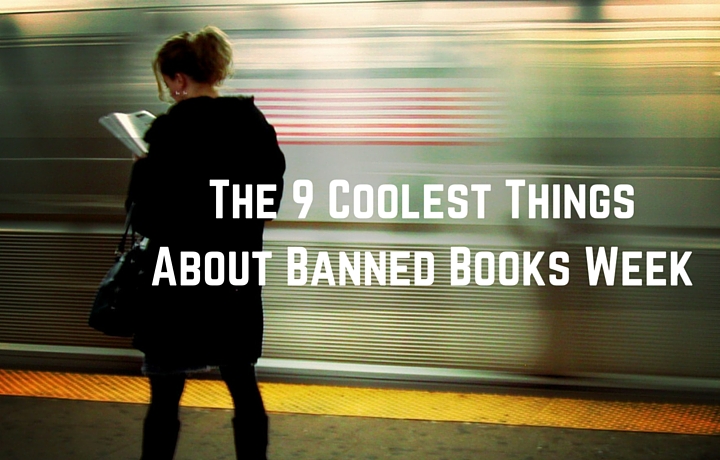Happy Banned Books Week!
Banned Books Week is a celebration of our freedom to write and read what we like, and a reminder that there are, and always have been, people who think that banning books is a good idea. As the ACLU states:
Despite clear and simple language in the Bill of Rights, books have always been attacked by those that thought them lewd, dangerous, or offensive. The ACLU, the American Library Association, and teachers across the country urge people to pick up and read a book that’s been censored or banned.
Image from First They Came for the Books, Matt Bor’s fantastic infographic detailing the history of banned books.
The problem with banning books is that it sends us down a slippery slope of censorship—where someone else decides what is appropriate for us to read. I, for one, say Hell No! to that. While I don’t love that there are books that promote violence and hatred, the alternative of having a silenced citizenry is far more frightening to me.
Among challenged and banned books are many classics that contribute to our shared history and understanding. Here are a few of the most frequently-challenged books of all-time:
- To Kill a Mockingbird, by Harper Lee
- Animal Farm, by George Orwell
- The Grapes of Wrath, by John Steinbeck
- The Adventures of Huckleberry Finn, by Mark Twain
- The Color Purple, by Alice Walker
- I Know Why the Caged Bird Sings, by Maya Angelou
- The Well of Loneliness, by Radclyffe Hall
- The Catcher In the Rye, by JD Salinger
- The Great Gatsby, by F. Scott Fitzgerald
- One Flew Over the Cuckoo’s Nest, by Ken Kesey
- All Quiet on the Western Front, by Erich Maria Remarque
- Brave New World, by Aldous Huxley
- Lady Chatterley’s Lover, by DH Lawrence
- Ulysses, by James Joyce
According to the American Library Association, the top 10 frequently-challenged books of 2014, along with the reason they were challenged are:
1. The Absolutely True Diary of a Part-Time Indian, by Sherman Alexie
Reasons: anti-family, cultural insensitivity, drugs/alcohol/smoking, gambling, offensive language, sex education, sexually explicit, unsuited for age group, violence. Additional reasons: “depictions of bullying”
2. Persepolis, by Marjane Satrapi
Reasons: gambling, offensive language, political viewpoint. Additional reasons: “politically, racially, and socially offensive,” “graphic depictions”
3. And Tango Makes Three, Justin Richardson and Peter Parnell
Reasons: Anti-family, homosexuality, political viewpoint, religious viewpoint, unsuited for age group. Additional reasons: “promotes the homosexual agenda”
4. The Bluest Eye, by Toni Morrison
Reasons: Sexually explicit, unsuited for age group. Additional reasons: “contains controversial issues”
5. It’s Perfectly Normal, by Robie Harris
Reasons: Nudity, sex education, sexually explicit, unsuited to age group. Additional reasons: “alleges it child pornography”
6. Saga, by Brian Vaughan and Fiona Staples
Reasons: Anti-Family, nudity, offensive language, sexually explicit, and unsuited for age group. Additional reasons:
7. The Kite Runner, by Khaled Hosseini
Reasons: Offensive language, unsuited to age group, violence
8. The Perks of Being a Wallflower, by Stephen Chbosky
Reasons: drugs/alcohol/smoking, homosexuality, offensive language, sexually explicit, unsuited for age group. Additional reasons: “date rape and masturbation”
9. A Stolen Life, Jaycee Dugard
Reasons: drugs/alcohol/smoking, offensive language, sexually explicit, and unsuited for age group
10. Drama, by Raina Telgemeier
Reasons: sexually explicit
In celebration of Banned Books Week, I rounded up my top 9 coolest things about the holiday.
- Banned Books Week is a time to celebrate the freedom to read.
- Banned Books Week a reminder that some people would like to see anything that doesn’t fit their worldview banned. This is frightening, but important to remember.
- Banned Books Week brings attention to the importance of libraries and how awesome librarians are to uphold this simple-yet-essential freedom to read what we choose.
- Banned Books Week promotes the notion that it’s good to read viewpoints we don’t agree with to help us develop our own viewpoint.
- Banned Books Week encourages readers to branch out and read works they might not otherwise be exposed to.
- Banned Books Week promotes intellectual freedom in libraries, schools, and bookstores.
- The goal of Banned Books Week is “to teach the importance of our First Amendment rights and the power of literature, and to draw attention to the danger that exists when restraints are imposed on the availability of information in a free society.”
- Banned Books Week brings people together to discuss, celebrate, and read books, banned and otherwise.
- Banned Books Week serves to remind us that people have been persecuted and killed for expressing their viewpoint.
Why do you celebrate Banned Books Week? In the comments, let us know—I’d love to keep the list growing.
Photo: Mo Riza (CC-BY)







